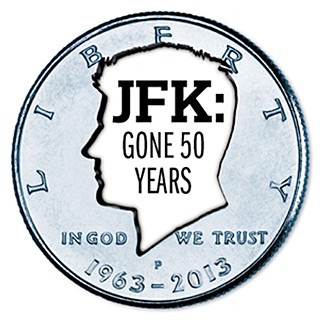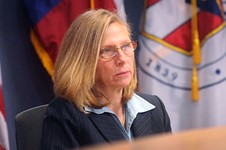Point Austin: Reflections on Assassination
Trying to find some wisdom on a grim anniversary
By Michael King, Fri., Nov. 22, 2013
I suppose we've nearly reached the historical tipping point of cultural obsession with the Kennedy assassination. Most younger people I know don't share my generation's sense that the moment marked a loss of American innocence; that current honor goes, understandably enough, to 9/11. Even so, as I discovered this week in soliciting and editing a group of writers on the subject ("Writers on Kennedy"), it turns out that there remains quite a bit to say about the subject of John F. Kennedy – although what we say now most often reveals much more about us than it does about the 35th president, or his era.
That's doubly true of the assassination conspiracy industry, which proceeds unabated and, with the 50th anniversary, is rising once again to a high-water mark. (A bit of it is on display in a scurrilous advertisement in this week's issue, and I'll say no more about that than it's both legal and easy to slander the dead.) It's important to recall that Kennedy's death was only the headline trigger for that historical loss of innocence; not simply that U.S. politics would never be the same, but that (as Jordan Smith notes in her contribution to the Kennedy feature) Americans are more vulnerable than (until that murder) we believed we were.
Beyond that truism is the fact that the subsequent U.S. war on Vietnam and Southeast Asia deepened public disillusion to a depth from which it has never recovered, and to a certain degree that's a good thing. Some illusions may be necessary, some inspiring, but far too many are covers for lies, self-deception, and political amnesia. Kennedy's legacy (like that of his successor Lyndon Johnson) is much more complicated and mixed than we could realize at the time, and like all of U.S. history, there is both glory and madness within it.
It Can't Happen Here
None of this was apparent to me in 1963, when I was a bright-eyed, buzz-cut freshman at Bishop Noll high school* in Hammond, Ind., sitting in an afternoon Latin class – yes, it was that long ago – and the news came that the president had been shot. As the first and still somewhat untrusted Catholic president (being a papist was among the long list of right-wing complaints against him), Kennedy was for Catholic schoolchildren like me, and our families, something of a secular saint. That he could be shot down with impunity stunned even the schoolboy hard cases in the room; several of us burst into tears, and only much later did it occur to me that we were weeping as much in fear for ourselves, our illusion of safety stripped away, as we were for a man little more to us than an image on a TV screen. I remember being shocked and angry that our Christian Brother teacher seemed so stoic and reserved in response to the shooting, telling us youngsters soberly (and gently) that such danger is among the risks of high office or public action.
Before too long, after the deaths of Martin Luther King Jr. and then Robert Kennedy, I would begin to understand what he meant. (A few months before, I had grabbed Robert Kennedy's outstretched hand during his visit to Indiana University and shouted, "Bring the troops home now!" and was callously proud that he had blanched.) Disillusionment came fast and furious in those years.
Bitter Wisdom
Fifty years on, with many things changed both for better and worse, I still wonder at the institutional immobility of so many things in American life, at our still reflexive foreign policy of imperial war on less powerful nations, at the staggering, deleterious national inequality (that both JFK and especially LBJ stemmed for only a brief time), at the ubiquitousness of guns, the dailiness of shootings, and the intermittent gun massacres that have become seemingly inevitable aspects of U.S. public life. That there is definitely a cultural and political relationship among all these things seems inarguable; that as a country we seem unable to successfully address these problems in any consistently effective way questions the fundamental soundness of our forms of government.
It's become a cultural commonplace that until Kennedy, Jackie, and the Sixties came along, the whole world was monochrome; fashion, art, and music were moribund; and of course sex hadn't even been invented yet. The whole culture was asleep until sex, drugs, and rock & roll came along and simultaneously woke us up and liberated the whole lot of us. As Hemingway wrote in a somewhat different context, but after an even more greatly disillusioning modern war, "Isn't it pretty to think so?"
As more than one commentator has noted, the polarized U.S. public atmosphere under the two Barack Obama administrations, 50 years later, is eerily reminiscent of the polarized public atmosphere under the oh-so-brief Kennedy administration. There is little unity of public purpose, the national governing process at least appears irretrievably broken, and ever-growing inequality has emboldened a significant political movement from the top to savagely cut the bottom out of the body politic. Conspiracy mongers on all sides rule much of our discourse, and the latest avatar of public engagement is the mass brandishing of weapons in public places – a movement yet duly pandered to by far too many of our would-be or actual public officials.
I might say Lee Harvey Oswald and his assassination-era followers have much to answer for, except that Oswald was much more a symptom than a cause. I'd like to end on a much more uplifting note, but on this grim anniversary, I'm afraid that's all I've got.
*Correction: In my haste, I initially placed my young self in Our Lady of Perpetual Help elementary school; but by 1963 I was a high school freshman. The rest of the anecdote is as I recall it.
Got something to say on the subject? Send a letter to the editor.











